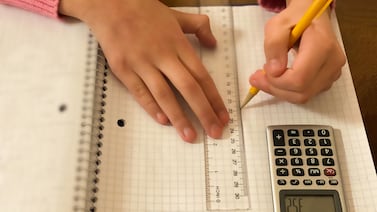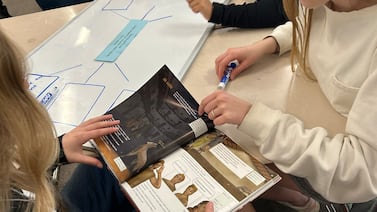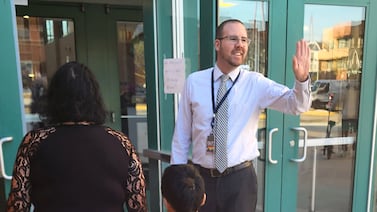Inside two classrooms at Infinity Math, Science & Technology High School in Little Village, dozens of students huddled at long rectangular tables on a Thursday afternoon in mid-November. They studied laptops, scoured notes, and scribbled on worksheets, working in pairs as juniors helped underclassmen catch up on English, algebra, and history assignments.
Chris Luna, a 16-year-old junior, sat next to a freshman and looked down at a handout before firing off a few questions about “The Moor’s Account” by Laila Lalami.
“Who did it?”
“Why did it happen?
“Because they lied,” the freshman offered with some hesitation.
“Right here you were telling me how you were noticing some things,” Luna said, pointing to a paragraph. “I’ll read it for you.”
This is “Thursday Academy” — Infinity High school’s free tutoring program.
The program, run by two teachers who are paid through the school’s budget, received a boost last spring when a few juniors stepped up to help.
This fall, dozens more students like Luna, who are completing their high school and associate degrees simultaneously as part of an early college program, have taken up the mantle to help students who need a little extra support.
“I feel like tutoring does make a change and a difference,” Luna said, noting the three freshmen he tutors have seen their grades improve. “It really does make an impact.”
Infinity’s tutoring program comes at a time when national test scores have seen precipitous declines in proficiency in both math and reading – fallout from disruptions caused by the pandemic. Chicago’s test scores released last month showed sharp declines in math. Across the nation, school districts including Chicago Public Schools are using federal relief funds to hire tutors and paraprofessionals to help students catch up in reading and math.
Infinity High School’s tutoring program, which has been around for about 10 years, expanded last March after students began to explore ways of giving back to their community, said Kyle Birch, a psychology teacher at the Little Village school.
“It kind of morphed into something much bigger than I could have imagined,” Birch said.
Upperclassmen help meet tutoring demand
Seniors Amanda Garcia and Lisett Avalos remember walking into the tutoring room in March and seeing two teachers try to help 30 students at the same time. That prompted the 17-year-old students to recruit more juniors to bolster tutoring services, which were originally designed to be one-on-one sessions.
They didn’t have to plead or beg classmates to help, Garcia said. The other juniors jumped in willingly.
The program offers tutoring every Thursday and a four-hour session one Saturday per quarter. The primary focus is English, math, and world studies – classes in which students are struggling the most. Tutors also occasionally accompany their tutees to their classes to “step into their shoes,” Garcia said.
“They’re just students who kind of need a little extra support,” she added.
Garcia noted that pandemic disruptions hit students hard and impacted their educational habits. When she returned to school last fall, Garcia said she required support from teachers to get back on track.
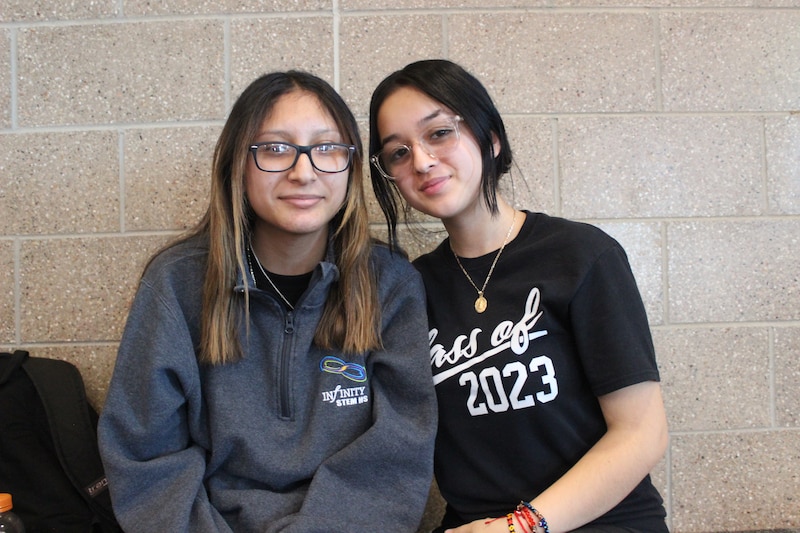
“I had a lot of teachers that were there for me that helped push me and got me going again,” Garcia said. “I think tutoring the freshmen and sophomores allowed me to give back what I got.”
Saul Salgado echoed Garcia, saying COVID-19 disruptions impacted their academics and mental health.
Now, the junior sees the tutoring program as a way to give freshmen a good foundation.
“I didn’t really have the right sources my freshman year so I want to give these students — the freshman and the sophomores — the right tools to succeed during their years in high school,” Salgado said.
Before students’ involvement, teacher Maria Ranieri, a co-coordinator of the tutoring program, required a lot of coordination to get students’ missing assignments linked to an online portal. Now, upperclassmen are not only guiding the underclassmen academically, they are also helping students develop additional skills, Ranieri said.
The tutors help students look up their grades, figure out which assignments are missing, communicate with teachers, and work to bring grades up, Ranieri said.
“Last year when we didn’t have the teachers, students didn’t enjoy coming,” Ranieri said. Now, they’re more receptive because they’re building relationships with peers “who’re investing time helping them.”
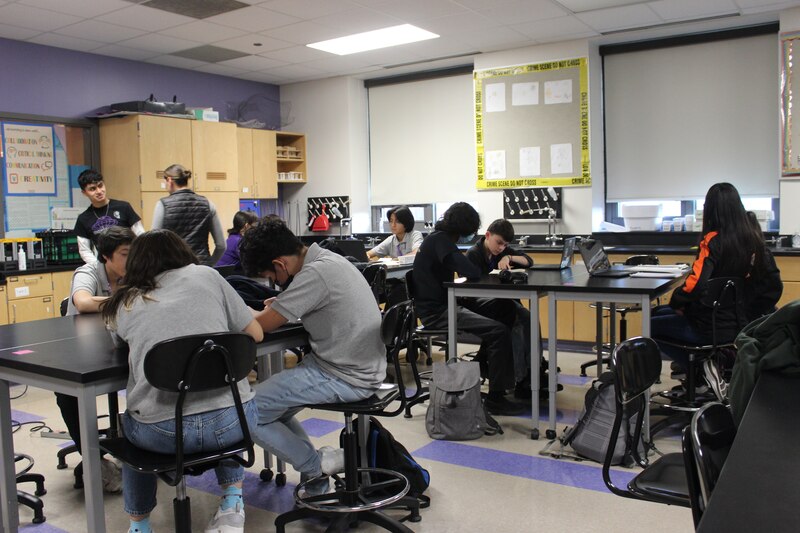
The peer tutoring and mentoring program also creates an organic pipeline to opportunities that underclassmen might not have considered, such as the Early College Program, which allows high school students to take college courses.
Last year, 16 out of 85 Infinity students graduated with their associate degree. Nearly 30% of graduating seniors and 50% of juniors are on track to graduate from high school with an associate degree, according to Birch.
For Infinity students, the early college and tutoring programs break stereotypes, defy expectations, and create solutions, Avalos said.
It flips the narrative some people have of Little Village students, Avalos added.
“I feel like it’s important that it grows,” Avalos said of the tutoring program. “We are not giving in to the stereotypes. We are going above and beyond.”
Peer tutoring hits different
Inside an Infinity High School classroom, some tutors milled about the room in mid-November, moving between a few students at a time. Since the spring, the program has grown with more students by word of mouth through encouragement by Mr. Birch, Garcia, and Avalos.
Melanie Rojas sat at a table explaining the rules of negative and positive integers to a freshman. She held a tablet, translating the question from English to Spanish for her student who arrived from Mexico during the pandemic.
“I’ve been in her shoes because my first language was not English,” Rojas said, “so I try to guide and translate things for her.”
In the two months of tutoring, Rojas has noticed her student become more comfortable.
“I feel like it’s definitely made an impact on her,” the 16-year-old said.
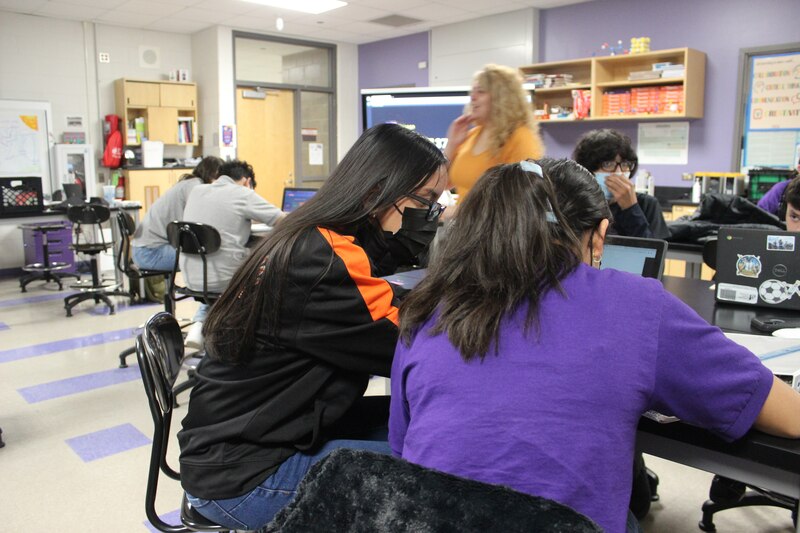
Nearby Melanie’s twin brother Bryan Rojas, 16, wrapped up a history assignment with freshman Ulises Estrada, 15. As Ulises packed his backpack, Bryan Rojas offered a gentle reminder to avoid missing assignments.
“Try not having any missing assignments,” Bryan said. “Because, like, it helps to get some points than to get zero points.”
Ulises nodded in response.
Since starting tutoring earlier this year, Ulises understands the material better and has seen his grades improve.
“I mostly don’t want to ask questions to the teacher,” Ulises said, who feels more comfortable asking his tutor for help.
“It’s been pretty good,” Bryan said. “You get to know more people — the future generation. It feels good to help others.”
Mauricio Peña is a reporter for Chalkbeat Chicago, covering K-12 schools. Contact Mauricio at mpena@chalkbeat.org.


